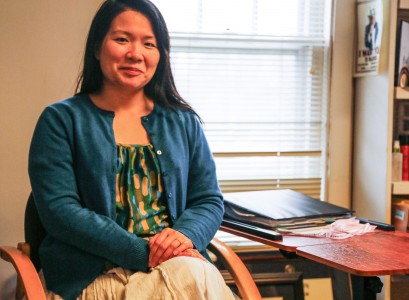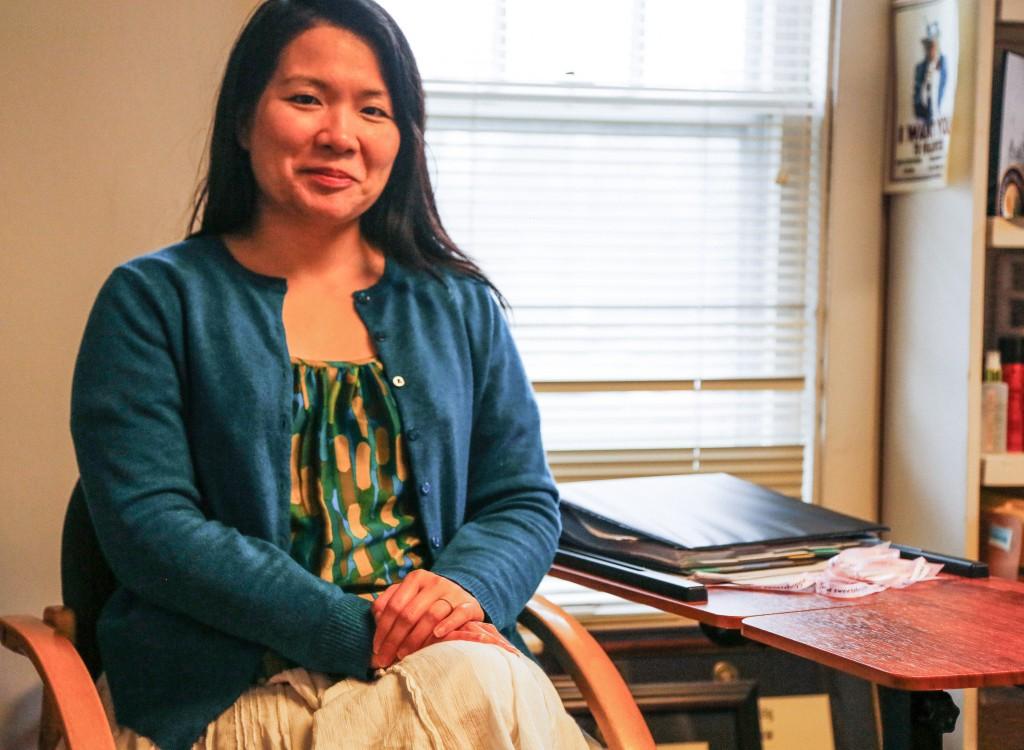Coordinator of the Grinnell Prize and Innovation Fund Melisa Chan will be leaving Grinnell at the end of the semester, citing a plan to join her family in Texas. She will be handing over both of these major projects, which she has expanded and improved during her time at the College.
Chan came to Grinnell in January 2011 with a background in environmental law. Chan was also familiar with the school: Grinnell hired her husband, a Spanish professor, in fall 2010. Chan’s first assignment was to develop the selection process for the then-new Grinnell Prize, which the College solicited nominations for in 2010. When Chan first took on the task of managing the Prize, there were over 1,200 applications from across the world. However, sheer volume was not Chan’s only challenge.
“When the Prize first came out, I think people were very unsure of what it was,” Chan recalled. “People needed to be invested in it … They needed to feel like this was their prize.”
Accordingly, Chan brought in students and alumni in addition to faculty and staff in order to review applicants using a point system. At first, reviewers were selected via word of mouth. Now, anyone can volunteer to be part of the process by being a reviewer, researcher or selection committee member. All positions can be applied for through the Prize’s section of Grinnell’s website. Overall, this openness has been beneficial for the Prize, Chan said.
“This past cycle, we actually had the most alumni [reviewers] ever,” Chan noted. “We’ve gotten great feedback, especially from … young alumni … [who] may not be at a point in their lives where they can give back monetarily but can give back with their expertise.”
However, expertise does not come solely from the College. The 10-person selection committee, which determines winners from the top-ranked applicants, also includes community members. Likewise, Chan worked to ensure that the Prize itself will go beyond the confines of the College.
“The Prize should be reflective of the world,” Chan said. “[There] are lots of problems out there—domestically and internationally.”
As an example, Chan cited 2012 prizewinners Jacob Wood and William McNulty, whose organization, Team Rubicon, partners veterans with disaster-relief efforts.
“It brought a conversation to the campus that isn’t really talked about a lot here,” Chan said. “Military service, the war, veterans … It brought to light a lot of issues that this campus in particular hasn’t focused on.”

Photo by Frank Zhu.
Above all, Chan sees the Prize as an opportunity to build long-lasting connections and expand networks of interests, ideas and more.
“[The goal is that] you get to meet these winners not only in formal talks … but also in more informal events like pub quiz night—like bowling night,” she said.
Some long-term relationships have indeed grown out of the Prize and Chan’s efforts. Winners have offered internships, taught short courses and even partnered with alumni working in the nonprofit sector. Many student groups have also been inspired by the work of past Grinnell Prize winners. For instance, AppDev, Grinnell’s student-run Application Development team, was inspired by 2012 winner Jane Chen’s workshop on design. The group was a result of Chan’s major second project: the Innovation Fund, which was created in the spring of 2013. It offers 500,000 dollars annually to students, faculty and staff who possess, as Chan puts it, “innovative ideas about teaching and learning.”
However, there is no formal link between these two programs. Yet with both the Fund and the Prize having made significant developments in recent years, Chan hopes to foster a culture of innovation that will continue after her departure.
Chan currently oversees 20 active projects, including AppDev, the new Wellness Lounge and several ideas for new learning centers. After Chan departs, the Grinnell Prize and the Innovation Fund will be moving to different departments.
“There have been great synergies between the Grinnell Prize and the Innovation Fund … but there’s nothing explicit [in terms of a connection between them],” Chan said. “Which is why, in the transition, the two programs are being completely separated.”
The Fund will move to the new Center for Teaching, Learning and Assessment, where Interim Dean of Students and Interim Vice President for Academic Affairs David Lopatto, Psychology, will oversee it.
“That fits right in with what the Innovation Fund is,” Chan said of the move. “That just makes sense strategically.”
For its part, the Grinnell Prize will move to the Center for Careers, Life, and Service (CLS). There, Assistant Director of Service Learning and Engagement Susan Sanning will work with current Program Associate Saunia Powell ’02. In fact, the Grinnell Prize has long worked in conjunction with the CLS.
“The idea of putting [the Prize] firmly into the CLS—we already do that … We have GRINNELLINK internships … and externships with the winners,” Chan explained. “We try to do all these things to have [the winners] firmly embedded within the College.”
Despite her departure, Chan said that the programs will only continue to improve, and that she is grateful to have played a part in the development of these two programs as well as in the College’s greater missions.
“I’m very privileged to have been able to work on two very high-profile, innovative projects for the president,” she said. “So I would give the president kudos for believing in me and giving me the flexibility to exercise my judgment.”





























































